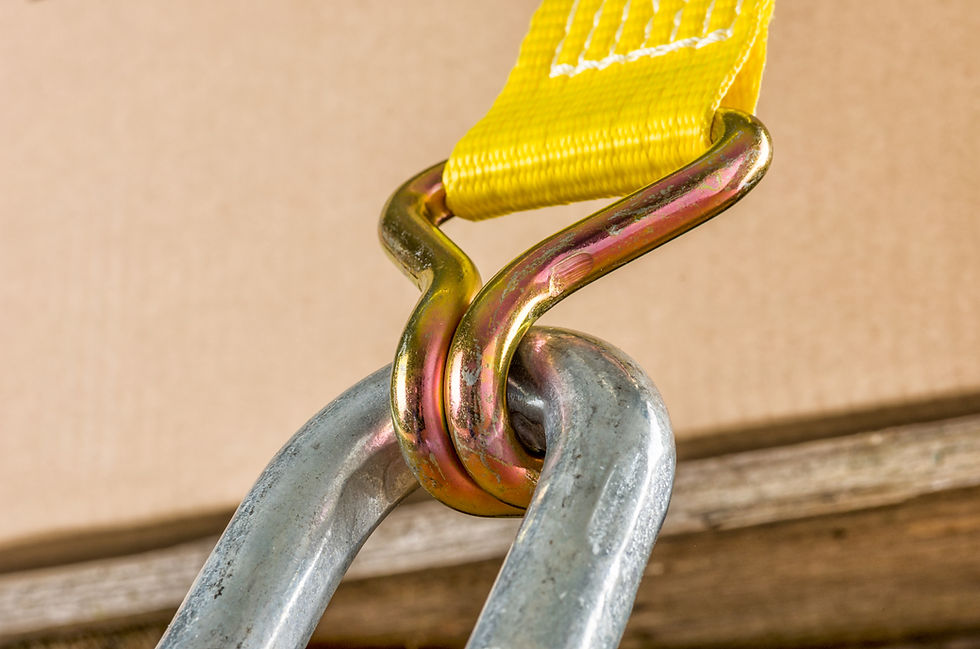TOWARDS ZERO SERIOUS TRAFFIC INJURIES: DRIVER SAFETY CHECKS FOR LCV
- Saskia Harreman

- Mar 31, 2021
- 3 min read
Updated: Feb 17, 2024

Many organisations consider the safety and compliance of their light commercial vehicle (LCV) fleet a major burden. Not without reason: driver carelessness can not only have far-reaching financial implications, but can also be the cause of serious injury or even loss of life. No less than a third of road deaths and a quarter of collision-related serious injuries involve work-related driving.
Shifting loads in vans are the cause of many accidents. In fact, a van is only as safe as the measure in which the load it is carrying is secured and safe. The good news is that awareness regarding the secure transportation of items has increased over the past years. Especially as drivers are legally responsible for making sure any load in or on top of a van is securely fastened, and that the maximum authorised mass (MAM) or permissible gross vehicle weight (GVW) is not exceeded.
Driver safety checks for LCV are important. To help drivers maintain the highest safety standards, we’ve drawn up a list of 6 simple checks that they can carry out to maximise their own safety and that of other road users.

1. MAXIMUM WEIGHT
Make sure your van never exceeds its maximum operating weight. This so-called Gross Vehicle Weight Rating is the maximum permissible weight, including the chassis, engine, driver, passengers, fuel and cargo. Find it on the vehicle ID plate or in the manufacturer’s handbook.
2. LOADING
Always check beforehand if there is sufficient space in the van for the items already in the van or items that need to still be loaded.
While loading, make sure the cargo area is sufficiently lit to see what you are doing and to enable you to make sure that items have been properly and securely loaded.
3. DRIVER HEALTH AND SAFETY
Your health and safety is paramount for any fleet operation. It’s important therefore that you safeguard yourself from injury during the loading or unloading of your van.
Never lift more than 25kg on your own
Don’t try to lift any significant weight above waist height
Seek help to assist with loading/unloading items exceeding this weight limit, or else use a sack barrow or hand truck
4. SAFETY INSIDE THE VAN
Unfortunately, the risk of serious injury caused by loose items in the passenger area of a van is hugely underestimated. A laptop on the empty seat next to the driver, a mobile phone on the dashboard: such everyday items can become lethal weapons in case of a sudden stop. Never place unsecured objects in the cab of the vehicle or directly behind occupants.
5. SECURING THE LOAD
Never load anything if its outer packaging is damaged in any way. Ensure the weight of the items is safely distributed across the cargo area to keep the vehicle safely balanced. Heavier objects should be placed closer to the floor to keep the centre of gravity as low as possible.
The positioning of the load and the weight can be of influence on your van’s driving performance. Obviously, a more heavily loaded vehicle is slower to accelerate and requires a longer braking distance than a vehicle carrying a lighter load.
Be sure to regularly check the load throughout the day. Double-check restraints and lashings or reposition items to keep the vehicle evenly balanced. Stow tools and equipment in racking systems if provided.
6. ROOF & LADDER RACKS
When using roof bars or a roof rack, always take extra care to load and secure items. It’s preferable to minimise weight on the roof for reasons of safety. Never exceed the maximum weight as indicated by the vehicle manufacturer.
Double check that you have secured everything tightly before setting of and continue to do so regularly during the day or if the vehicle has been left overnight. If clamps or straps show signs of wear and tear replace them soonest.
How Mobility Switch can help with driver safety checks for LCV
Having advised organisations with LCV fleets for many years, Mobility Switch offers you tailored advice on how to implement best practices for vehicle compliance. Let us help you future-proof your fleet for legislative changes to come or support you with the implementation of an e-LCV programme.
Let’s meet and discuss the challenges related to your LCV fleet.
‘A van is only as safe as the measure in which the load it is carrying is secured and safe’



Comments